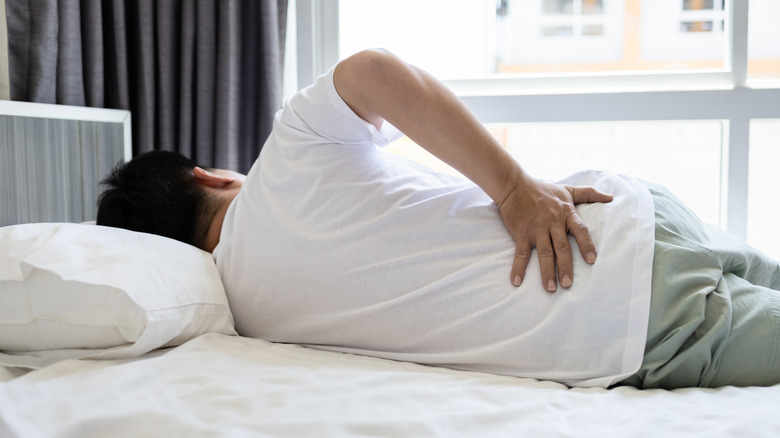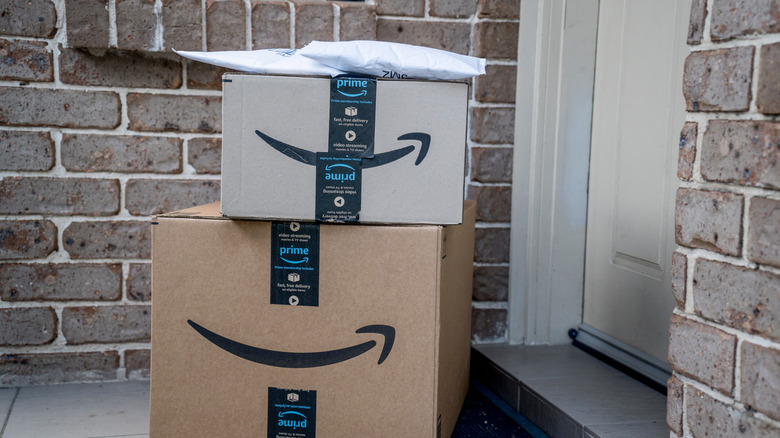You've Been Warned: Buying Mattresses On Amazon Could Cost You
For many consumers, Amazon has become a one-stop shop for all of life's necessities. From health and beauty to pet supplies to clothing, Amazon can be a quicker and easier way to get the things you need most without spending the extra time or money required to drive to different stores. Amazon's popularity is booming with a 14% increase in sales in 2023 (compared to 2022) and $30.4 billion in profits according to the company's 2023 yearly financial report. According to a Bloomberg analysis of Consumer Intelligence Research Partners data, Amazon Prime subscription memberships hit a record high of 180 million U.S. consumers in March 2024. At the time, that marked an 8% increase in membership compared to the year before, and meant that an astonishing 75% of shoppers in the U.S. had a Prime membership.
All of this is to say that chances are good that you not only use Amazon, but might even find yourself increasingly relying on it for new purchases across multiple categories (we broke down if the perks of an Amazon Prime membership are worth the annual cost). While, for many, the convenience and ability to read product reviews can be significant benefits to using Amazon, it might not necessarily be the best place for all of your purchases. In fact, while Amazon has a lot to offer consumers, there are some specific items it might be best to steer clear of entirely and instead shop for directly from retailers. One item, in particular, is mattresses.
Mattresses
Mattresses are not only a deeply personal purchase, but also one with a high chance of needing to be exchanged or returned. Since it is impossible to test out a mattress online, consumers can't really know if a mattress will ultimately fit their needs before actually sleeping on it for a few nights. This is where ordering your mattress from Amazon can be a problem. For starters, many of the products available for sale on Amazon are actually sold through third party sellers, meaning they might have specific return policies or trial periods that don't align with how long you might need to actually test out the product.
If, by chance, you do purchase your mattress from Amazon directly, you only have 30 days to return the mattress if you decide it isn't the right one for you. This is a significantly shorter trial period than many mattress manufacturers offer their customers. According to the Sleep Foundation, the average mattress sleep trial is usually between 90 and 120 nights. Most of the time these trials also include something known as a break-in period which can last anywhere from two weeks to an entire month. This means Amazon's 30-day return policy could be too short to actually determine if your mattress is right for you. Not to mention how complicated it can be to try and coordinate shipping to return the mattress. This can be especially true of memory foam style mattresses which are often shipped compressed in air-sealed bags in order to be smaller for shipping.
Downsides of online shopping
Mattresses aren't the only things to avoid when shopping online. From an increased risk of fake products to higher chances of fraud, there can be significant downsides. There are even certain products we recommend never buying online, on Amazon or any other site. To make matters worse, some online shopping hazards are only going to get worse in 2025. Chief among the potential for problems is shipping. Not only has the price of shipping continued to increase over the last several years, but if some of Donald Trump's tariff policies go into effect (especially in relation to large trading countries like China) you can expect shipping prices to get even worse. Not to mention how much those same tariffs can increase the price of the items you might be looking for. While tariff fueled price increases will also affect in-store purchases, you can save yourself the added expense and hassle of shipping troubles.
In addition to the added cost of shipping is the potential hassle of dealing with broken, damaged, or even stolen goods that you've ordered online. Whether damaged during the shipping process (60% of Americans reported receiving damaged goods when ordering online in 2024, according to a survey from DS Smith) or stolen during the delivery process ($12 billion worth of packages were stolen from as many as 58 million Americans in 2024, according to a Security.org report) the chances are higher that you will wait longer and have a lower rate of success with your online orders than when shopping in person.


